Interview With an Expat: Peter DeMarco on Getting a University Job in Korea
Are you looking for a university job in Korea? Josh Sokolow gets the how-to from Profs Abroad founder Peter DeMarco.
 An avid traveler and ex-English teacher in South Korea, Josh was thrilled to get to sit down with ProfsAbroad.com founder Peter DeMarco to talk about the ins and outs of the university teaching industry in South Korea.
An avid traveler and ex-English teacher in South Korea, Josh was thrilled to get to sit down with ProfsAbroad.com founder Peter DeMarco to talk about the ins and outs of the university teaching industry in South Korea.
Originally from Connecticut, Peter DeMarco is a teaching veteran: Barcelona, Venezuela, Jeju, and Busan are all places he has lived and taught. He now teaches at a university in Busan, when not running Profs Abroad, of course.
Here’s how that conversation went.
Josh: Hey Pete, thanks for chatting with me. First off, how should people applying for a university job in Korea go about it?
The university semesters start in September and March and most ads get posted during the 3-4 month period before that. Korean universities advertise for open positions as far as 6 months in advance. Peter: The first thing, more important than any other, is you’ve got to sell yourself. Don’t just answer job ads. It’s been proven that if you figure out where you want to work and go after jobs instead of waiting them to come to you, you have a drastically higher chance of getting hired. I talk about how to do this here.
The second thing would be to network. Get out and meet people. It can be related to English, like KOTESOL, or something just for fun such as an outdoor club or a group pertaining to your hobby. If you live outside of Korea, try to meet people online. There are plenty of Korea-specific groups on social media sites, blogs by other teachers, and websites.

The last and most obvious thing would be to answer job ads. It’s not the best method to find work, but you can’t ignore it since so many people get hired this way. The semesters start in September and March and most ads get posted during the 3-4 month period leading up to the start of the semester. However, Korean universities advertise for open positions as far as 6 months in advance.
Many ESL teachers get their first university job in Korea, why do you think this is?
 Korea is the number one employer of university, English-language instructors in the world. There are around 2,000 native English instructors in Korea now, and in the last year over 200 job ads have been posted for positions in Korea. Each ad is usually looking to hire a number of lecturers, too. Some universities have as many as 70 or more foreign English lecturers on staff, although I think the average is around 20-30.
Korea is the number one employer of university, English-language instructors in the world. There are around 2,000 native English instructors in Korea now, and in the last year over 200 job ads have been posted for positions in Korea. Each ad is usually looking to hire a number of lecturers, too. Some universities have as many as 70 or more foreign English lecturers on staff, although I think the average is around 20-30.
Do you need an MA degree to teach at a university in Korea?
Absolutely not! That is a myth. In the last 6 months there were over 50 job openings in Korea that didn’t require an MA. I know because if the job posted says you don’t need an MA, it’s put in a separate category on Profs Abroad.
To Teach at a Korean University… The new rules are that you “must” have a BA and 4 years of university teaching experience, or an MA and 2 years of university experience. Although having an MA (in any field) will greatly increase your chances of getting hired, you can definitely still get hired without one. The new rules are that you “must” have a BA and 4 years of university teaching experience, or an MA and 2 years of university experience.
However, the supply of qualified teachers willing to accept the current job offers still outweighs the demand. What is happing now is that some universities are hiring people with no MA and/or no university teaching experience. To get around the legalities, these “unqualified” teachers are hired on a part-time (hourly) contract basis.
What should a new teacher expect in a Korean university, and how can they prepare to have a successful year?
I could write a whole book just on this question. All the typical clichés fit here like ‘expect the unexpected’ or ‘be prepared’. But I think the best thing anyone could do is, once you’re hired, get to know your coworkers. They will often help sort you out much better than your admin staff or coordinator can. Basically, try to find a mentor if one isn’t offered to you.
What type of salary and benefits should a teacher expect to receive at a Korean university?
I think another myth is that there is a standard salary or benefits package in Korea. What you can earn varies wildly – so much so that you could make double the salary teaching the same subject, for the same hours, in the same city, with the same requirements, but at a different job.
The key here is to forget about your absolute income (your total yearly salary) and focus on your relative income (your hourly rate). The reason is that at first glance, many jobs will look similar, say 2.5 million won per month. But when you break it down by hours, you can see that some jobs pay surprisingly better than others.
As a general rule, a competitive university salary in Korea pays around 80,000 – 120,000 won per class hour, although there are schools that pay much higher or lower than this.
If you want to find out how to calculate the hourly rate, I wrote about it here.
Are there any jobs in Korea that an expat should avoid?
Most universities in Korea are decent places to work at. You rarely hear horror stories like the ones from people working at private language academies or hagwons. That said, no job is perfect, and surely some places are better to work at than others.
First, you should look over your contract carefully. Here are 12 Points to Consider Before Signing A University Job Contract.
But the only real way to find out if a job is a good one is to talk to the people employed there. Ask your interviewers for the contact information of one or two people who are working there now. Once you talk to those people, ask those people to pass on the name of someone else if need be.
Beware of pillaging groups or forums on the Internet for info on your school though. Just because one person had a bad experience doesn’t mean the whole school is horrible. Also, department heads change, coordinators change, and the staff does too. It might not have been a good place to work a few years ago, but it could be fine now.
That’s all great information, thanks. Perhaps you could tell us a little about your website, Profs Abroad?
Sure thing. Profs Abroad is the top source of jobs and information for university and college English-language (ESL/EFL) faculty. If you’re looking for work, career advice, or classroom ideas, then the site is for you.
The site is not huge by any means, but it has been very well received so far. The last time I checked, there were jobs offered in 40 different countries. Most of the positions are located in Korea, Japan, China, and the Middle East. Our members are from all over the world, too, everywhere from Korea to America, Australia, and beyond.
Peter, thank you for taking the time to talk with me today, I really appreciate it.
It’s my pleasure.